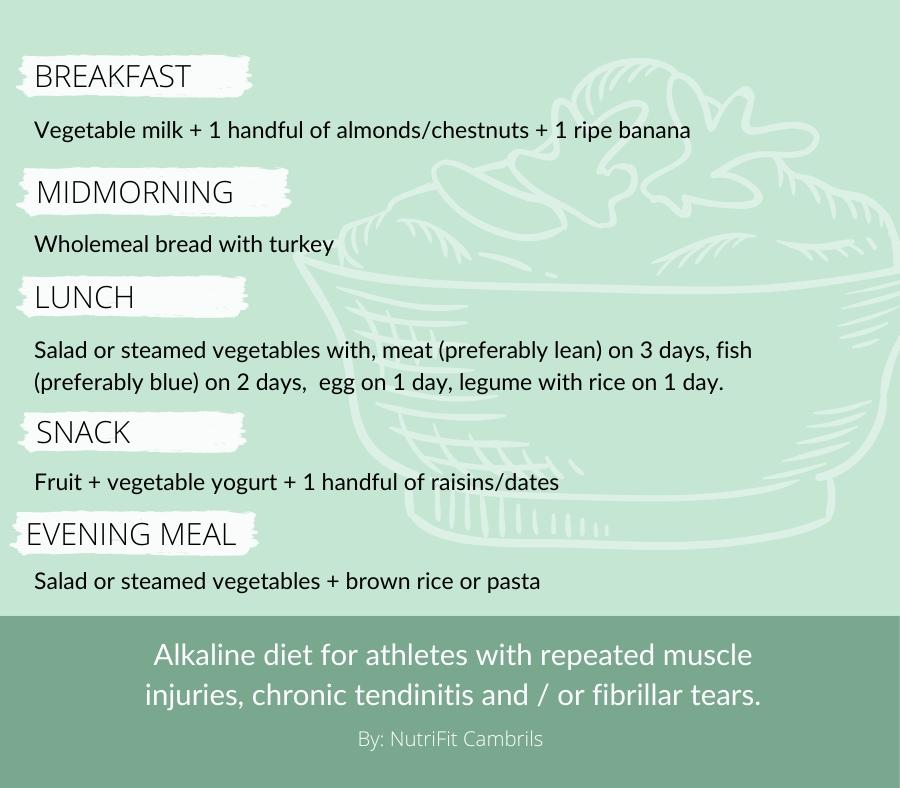The tissues and bones that make up our body need a supply of nutrients that is tailored to the needs of each athlete. For example, the physical effort made by a person who practices crossfit at a high level, is not the same physical effort a footballer makes, even at the highest competition level. But they do have something in common - when the diet is not well balanced, there is an increased risk of injury.
How does nutrition influence injuries?
Nutrition can influence injuries in two ways: firstly, as a way to prevent injury and secondly, as an aid to recover from an injury quicker and better.
How can we prevent injuries through food?
If we talk about preventing injuries, the most important thing is to maintain good hydration because it improves the flexibility of the joints.
To avoid muscle and tissue injuries, we must take into account collagen. Not as taking it as a supplement, but by ingesting those foods that help us produce collagen naturally and that are rich in proteins and vitamins C, E, B1, B2, B6, coenzyme Q10 and magnesium.
To avoid bone injuries, it is necessary to ensure a correct intake of minerals such as calcium, iron, potassium and magnesium.
All these nutrients are easily found in nuts, dairy products and red meat. Basically, it is about having a well-balanced and varied diet, for all people who practice sport. Only elite athletes require more comprehensive nutritional guidelines.
And when there is already an injury, how can food help us?
We would have to distinguish between two types of injuries: those that force the athlete to have the injured area immobilized (such as a break, a sprain etc) and those that are wear and tear injuries, that do not require to be immobilized. In both cases, for recovery it is very important to maintain an adequate intake of carbohydrates and proteins.
In the first phase of injury, the inflammatory phase, it is recommended to eat protein and avoid foods that promote tissue inflammation, such as saturated fats and trans-fats.
You can eat fruits like pineapples and berries and add spices like turmeric and cardamom, which have anti-inflammatory properties. Blue fish is also recommended, given its high content of omega3.
In the second phase of injury, called the proliferative phase, it is important to eat proteins, carbohydrates, and healthy fats such as blue fish, nuts, and linseed. Refined oils should be avoided at all costs.
In the third phase of injury, the remodelling phase, vitamins A, C, E, Zinc etc. are very important.
Other nutrition articles that might interest you
Would consuming carbohydrates be counterproductive, by not being able to burn them through sports?
In the third phase, the tissues need a lot of energy to be able to regenerate, this consumes between 15% - 40% of our basal metabolism rate. We actually need to slightly increase calorie intake. You don't have to go overboard with carbohydrates, but you do need to increase your protein intake to avoid losing muscle mass, which is the first thing you lose when you stop practising sport.
It is recommended to take in 2 grams of protein per kg of weight per day. If they cannot be obtained through food intake, they should be obtained through food supplements.
And what about amino acids?
Amino acids are also very important, especially leucine, which is one of the nine essential amino acids that the body cannot produce on its own. We must provide it through food. Leucine contributes to the growth and regeneration of muscle tissue. We can find it in eggs, soybeans, red meats, dairy products, fish and legumes ...
What are acidifying foods and alkaline foods and why are they important in preventing sports injuries?
Acidifying foods are those that provide more acidity to the body, such as: red meat, cheese, sugars, vinegar, alcohol, soft drinks, tea and coffee.
Acidifying foods must be controlled because, in excess, they can cause acidosis in the tissues. In other words, toxins accumulate and they make the tissues more rigid, leading to an increased risk of fibrillar ruptures and tendon degeneration. For this reason, hyperproteic diets are totally discouraged. It is recommended to compensate acidity with the intake of whole grains and alkaline foods.
Alkalinizing foods are those that help decrease acidosis in the tissues. Some of the best alkaline foods are: potatoes, greens and vegetables, ripe bananas, nuts, unrefined vegetable oils, blue fish…

Remember to always maintain a well-balanced and healthy diet and when in doubt, consult a certified nutritionist.
Contact us and discover all can we do for your team!







